Liyuan Wang
PACE: Pretrained Audio Continual Learning
Feb 03, 2026Abstract:Audio is a fundamental modality for analyzing speech, music, and environmental sounds. Although pretrained audio models have significantly advanced audio understanding, they remain fragile in real-world settings where data distributions shift over time. In this work, we present the first systematic benchmark for audio continual learning (CL) with pretrained models (PTMs), together with a comprehensive analysis of its unique challenges. Unlike in vision, where parameter-efficient fine-tuning (PEFT) has proven effective for CL, directly transferring such strategies to audio leads to poor performance. This stems from a fundamental property of audio backbones: they focus on low-level spectral details rather than structured semantics, causing severe upstream-downstream misalignment. Through extensive empirical study, we identify analytic classifiers with first-session adaptation (FSA) as a promising direction, but also reveal two major limitations: representation saturation in coarse-grained scenarios and representation drift in fine-grained scenarios. To address these challenges, we propose PACE, a novel method that enhances FSA via a regularized analytic classifier and enables multi-session adaptation through adaptive subspace-orthogonal PEFT for improved semantic alignment. In addition, we introduce spectrogram-based boundary-aware perturbations to mitigate representation overlap and improve stability. Experiments on six diverse audio CL benchmarks demonstrate that PACE substantially outperforms state-of-the-art baselines, marking an important step toward robust and scalable audio continual learning with PTMs.
FlyPrompt: Brain-Inspired Random-Expanded Routing with Temporal-Ensemble Experts for General Continual Learning
Feb 03, 2026Abstract:General continual learning (GCL) challenges intelligent systems to learn from single-pass, non-stationary data streams without clear task boundaries. While recent advances in continual parameter-efficient tuning (PET) of pretrained models show promise, they typically rely on multiple training epochs and explicit task cues, limiting their effectiveness in GCL scenarios. Moreover, existing methods often lack targeted design and fail to address two fundamental challenges in continual PET: how to allocate expert parameters to evolving data distributions, and how to improve their representational capacity under limited supervision. Inspired by the fruit fly's hierarchical memory system characterized by sparse expansion and modular ensembles, we propose FlyPrompt, a brain-inspired framework that decomposes GCL into two subproblems: expert routing and expert competence improvement. FlyPrompt introduces a randomly expanded analytic router for instance-level expert activation and a temporal ensemble of output heads to dynamically adapt decision boundaries over time. Extensive theoretical and empirical evaluations demonstrate FlyPrompt's superior performance, achieving up to 11.23%, 12.43%, and 7.62% gains over state-of-the-art baselines on CIFAR-100, ImageNet-R, and CUB-200, respectively. Our source code is available at https://github.com/AnAppleCore/FlyGCL.
Continual Action Quality Assessment via Adaptive Manifold-Aligned Graph Regularization
Oct 08, 2025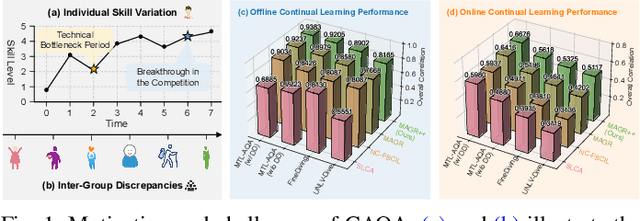
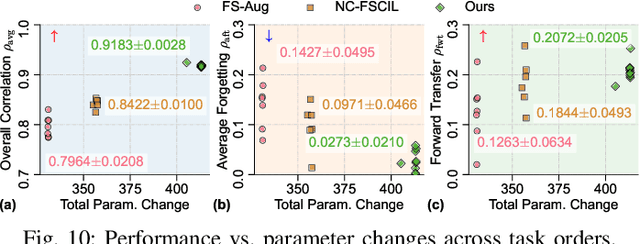
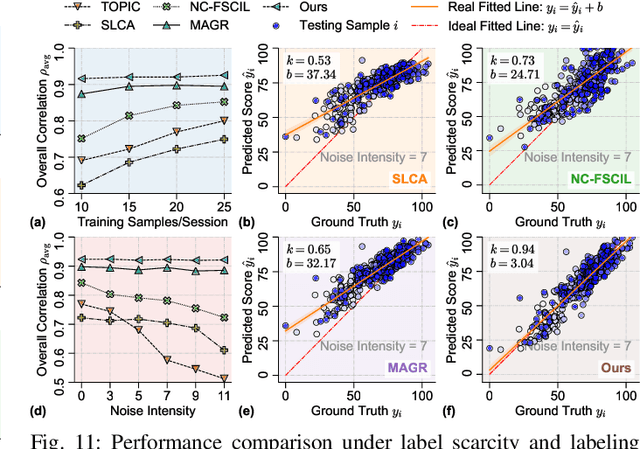
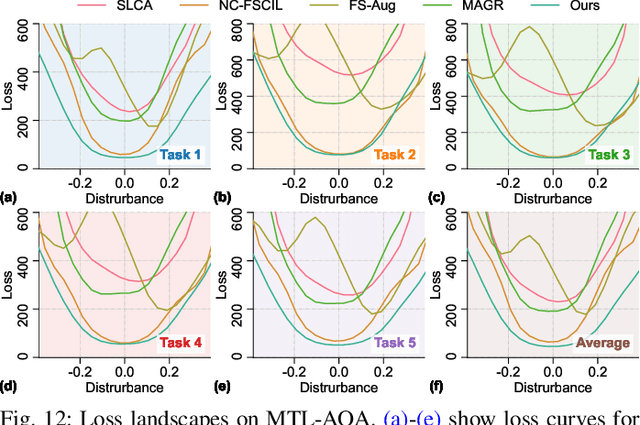
Abstract:Action Quality Assessment (AQA) quantifies human actions in videos, supporting applications in sports scoring, rehabilitation, and skill evaluation. A major challenge lies in the non-stationary nature of quality distributions in real-world scenarios, which limits the generalization ability of conventional methods. We introduce Continual AQA (CAQA), which equips AQA with Continual Learning (CL) capabilities to handle evolving distributions while mitigating catastrophic forgetting. Although parameter-efficient fine-tuning of pretrained models has shown promise in CL for image classification, we find it insufficient for CAQA. Our empirical and theoretical analyses reveal two insights: (i) Full-Parameter Fine-Tuning (FPFT) is necessary for effective representation learning; yet (ii) uncontrolled FPFT induces overfitting and feature manifold shift, thereby aggravating forgetting. To address this, we propose Adaptive Manifold-Aligned Graph Regularization (MAGR++), which couples backbone fine-tuning that stabilizes shallow layers while adapting deeper ones with a two-step feature rectification pipeline: a manifold projector to translate deviated historical features into the current representation space, and a graph regularizer to align local and global distributions. We construct four CAQA benchmarks from three datasets with tailored evaluation protocols and strong baselines, enabling systematic cross-dataset comparison. Extensive experiments show that MAGR++ achieves state-of-the-art performance, with average correlation gains of 3.6% offline and 12.2% online over the strongest baseline, confirming its robustness and effectiveness. Our code is available at https://github.com/ZhouKanglei/MAGRPP.
From reactive to cognitive: brain-inspired spatial intelligence for embodied agents
Aug 24, 2025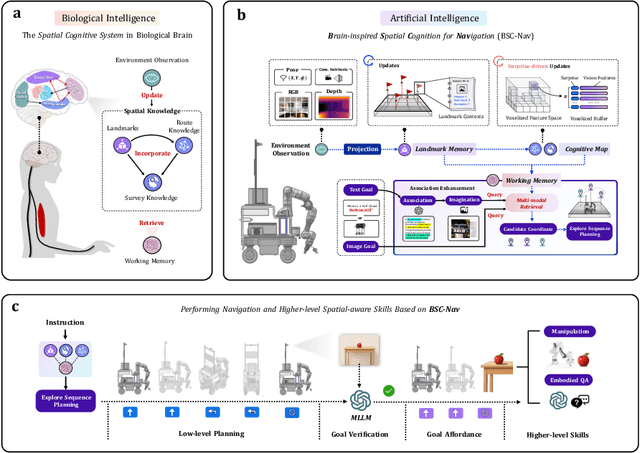
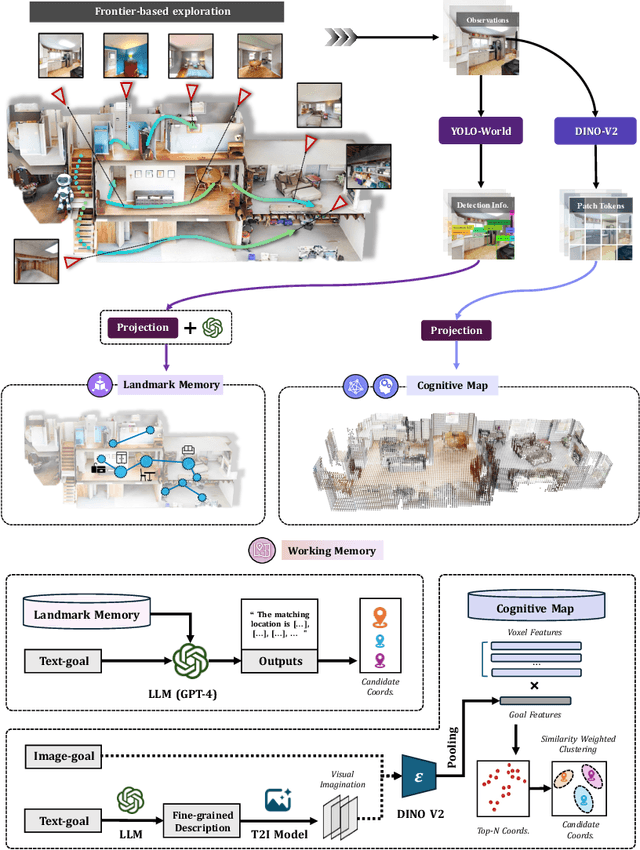
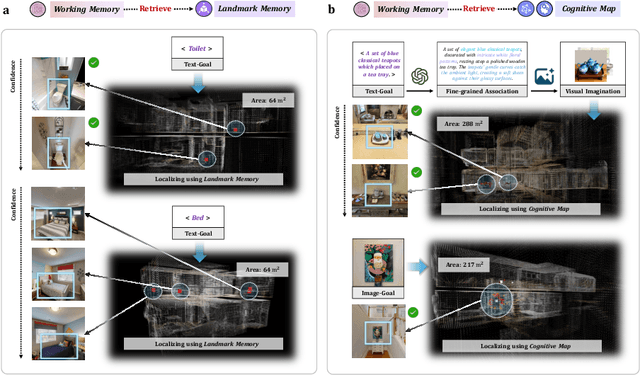
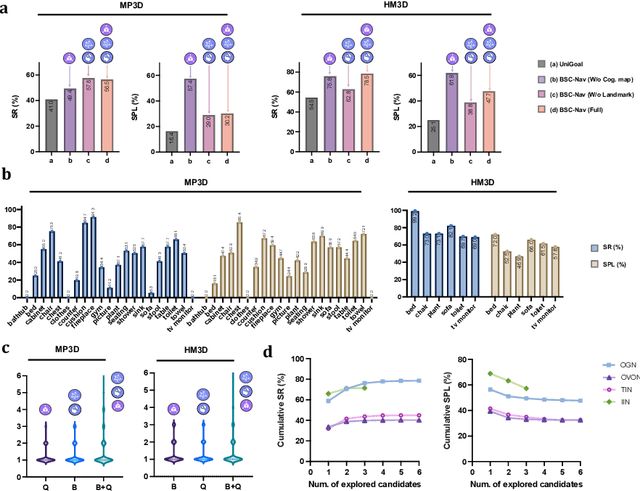
Abstract:Spatial cognition enables adaptive goal-directed behavior by constructing internal models of space. Robust biological systems consolidate spatial knowledge into three interconnected forms: \textit{landmarks} for salient cues, \textit{route knowledge} for movement trajectories, and \textit{survey knowledge} for map-like representations. While recent advances in multi-modal large language models (MLLMs) have enabled visual-language reasoning in embodied agents, these efforts lack structured spatial memory and instead operate reactively, limiting their generalization and adaptability in complex real-world environments. Here we present Brain-inspired Spatial Cognition for Navigation (BSC-Nav), a unified framework for constructing and leveraging structured spatial memory in embodied agents. BSC-Nav builds allocentric cognitive maps from egocentric trajectories and contextual cues, and dynamically retrieves spatial knowledge aligned with semantic goals. Integrated with powerful MLLMs, BSC-Nav achieves state-of-the-art efficacy and efficiency across diverse navigation tasks, demonstrates strong zero-shot generalization, and supports versatile embodied behaviors in the real physical world, offering a scalable and biologically grounded path toward general-purpose spatial intelligence.
Versatile Cardiovascular Signal Generation with a Unified Diffusion Transformer
May 28, 2025Abstract:Cardiovascular signals such as photoplethysmography (PPG), electrocardiography (ECG), and blood pressure (BP) are inherently correlated and complementary, together reflecting the health of cardiovascular system. However, their joint utilization in real-time monitoring is severely limited by diverse acquisition challenges from noisy wearable recordings to burdened invasive procedures. Here we propose UniCardio, a multi-modal diffusion transformer that reconstructs low-quality signals and synthesizes unrecorded signals in a unified generative framework. Its key innovations include a specialized model architecture to manage the signal modalities involved in generation tasks and a continual learning paradigm to incorporate varying modality combinations. By exploiting the complementary nature of cardiovascular signals, UniCardio clearly outperforms recent task-specific baselines in signal denoising, imputation, and translation. The generated signals match the performance of ground-truth signals in detecting abnormal health conditions and estimating vital signs, even in unseen domains, while ensuring interpretability for human experts. These advantages position UniCardio as a promising avenue for advancing AI-assisted healthcare.
From Token to Line: Enhancing Code Generation with a Long-Term Perspective
Apr 10, 2025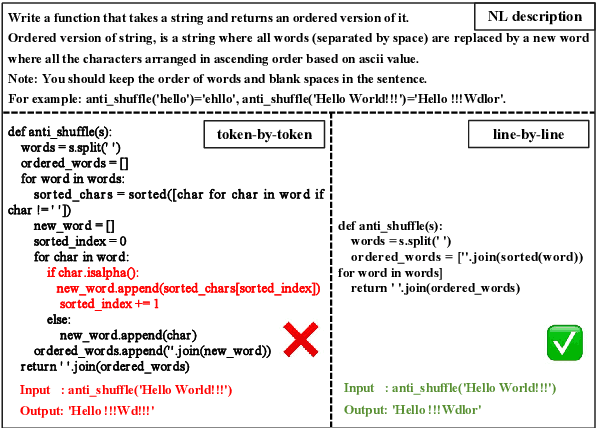
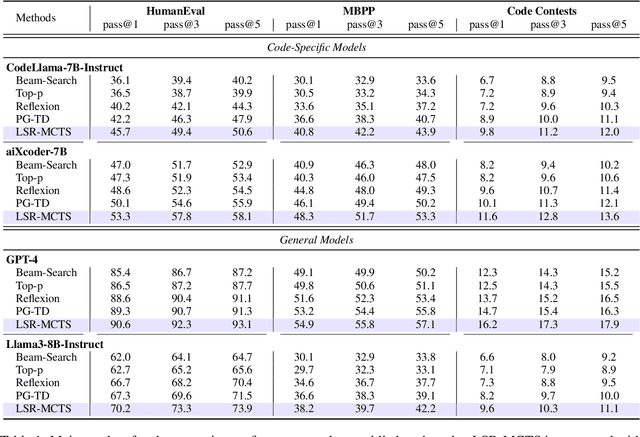
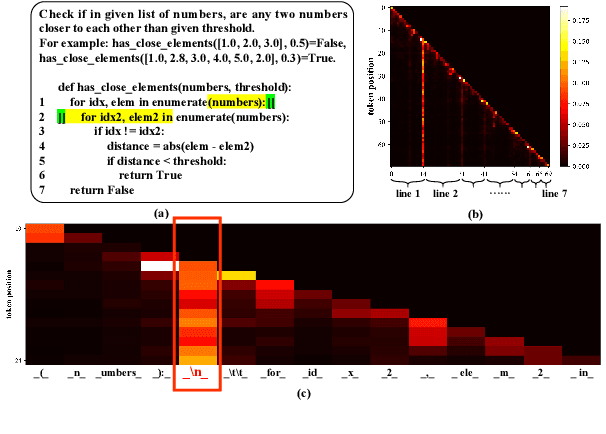
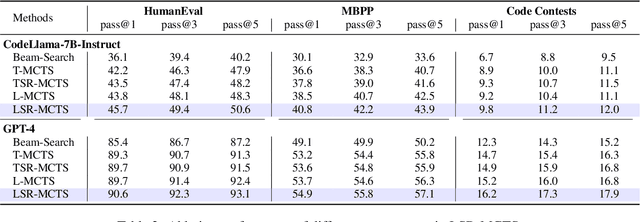
Abstract:The emergence of large language models (LLMs) has significantly promoted the development of code generation task, sparking a surge in pertinent literature. Current research is hindered by redundant generation results and a tendency to overfit local patterns in the short term. Although existing studies attempt to alleviate the issue by adopting a multi-token prediction strategy, there remains limited focus on choosing the appropriate processing length for generations. By analyzing the attention between tokens during the generation process of LLMs, it can be observed that the high spikes of the attention scores typically appear at the end of lines. This insight suggests that it is reasonable to treat each line of code as a fundamental processing unit and generate them sequentially. Inspired by this, we propose the \textbf{LSR-MCTS} algorithm, which leverages MCTS to determine the code line-by-line and select the optimal path. Further, we integrate a self-refine mechanism at each node to enhance diversity and generate higher-quality programs through error correction. Extensive experiments and comprehensive analyses on three public coding benchmarks demonstrate that our method outperforms the state-of-the-art performance approaches.
Adaptive Score Alignment Learning for Continual Perceptual Quality Assessment of 360-Degree Videos in Virtual Reality
Feb 27, 2025Abstract:Virtual Reality Video Quality Assessment (VR-VQA) aims to evaluate the perceptual quality of 360-degree videos, which is crucial for ensuring a distortion-free user experience. Traditional VR-VQA methods trained on static datasets with limited distortion diversity struggle to balance correlation and precision. This becomes particularly critical when generalizing to diverse VR content and continually adapting to dynamic and evolving video distribution variations. To address these challenges, we propose a novel approach for assessing the perceptual quality of VR videos, Adaptive Score Alignment Learning (ASAL). ASAL integrates correlation loss with error loss to enhance alignment with human subjective ratings and precision in predicting perceptual quality. In particular, ASAL can naturally adapt to continually changing distributions through a feature space smoothing process that enhances generalization to unseen content. To further improve continual adaptation to dynamic VR environments, we extend ASAL with adaptive memory replay as a novel Continul Learning (CL) framework. Unlike traditional CL models, ASAL utilizes key frame extraction and feature adaptation to address the unique challenges of non-stationary variations with both the computation and storage restrictions of VR devices. We establish a comprehensive benchmark for VR-VQA and its CL counterpart, introducing new data splits and evaluation metrics. Our experiments demonstrate that ASAL outperforms recent strong baseline models, achieving overall correlation gains of up to 4.78\% in the static joint training setting and 12.19\% in the dynamic CL setting on various datasets. This validates the effectiveness of ASAL in addressing the inherent challenges of VR-VQA.Our code is available at https://github.com/ZhouKanglei/ASAL_CVQA.
Right Time to Learn:Promoting Generalization via Bio-inspired Spacing Effect in Knowledge Distillation
Feb 10, 2025



Abstract:Knowledge distillation (KD) is a powerful strategy for training deep neural networks (DNNs). Although it was originally proposed to train a more compact ``student'' model from a large ``teacher'' model, many recent efforts have focused on adapting it to promote generalization of the model itself, such as online KD and self KD. % as an effective way Here, we propose an accessible and compatible strategy named Spaced KD to improve the effectiveness of both online KD and self KD, in which the student model distills knowledge from a teacher model trained with a space interval ahead. This strategy is inspired by a prominent theory named \emph{spacing effect} in biological learning and memory, positing that appropriate intervals between learning trials can significantly enhance learning performance. With both theoretical and empirical analyses, we demonstrate that the benefits of the proposed Spaced KD stem from convergence to a flatter loss landscape during stochastic gradient descent (SGD). We perform extensive experiments to validate the effectiveness of Spaced KD in improving the learning performance of DNNs (e.g., the performance gain is up to 2.31\% and 3.34\% on Tiny-ImageNet over online KD and self KD, respectively).
A Comprehensive Survey of Action Quality Assessment: Method and Benchmark
Dec 15, 2024Abstract:Action Quality Assessment (AQA) quantitatively evaluates the quality of human actions, providing automated assessments that reduce biases in human judgment. Its applications span domains such as sports analysis, skill assessment, and medical care. Recent advances in AQA have introduced innovative methodologies, but similar methods often intertwine across different domains, highlighting the fragmented nature that hinders systematic reviews. In addition, the lack of a unified benchmark and limited computational comparisons hinder consistent evaluation and fair assessment of AQA approaches. In this work, we address these gaps by systematically analyzing over 150 AQA-related papers to develop a hierarchical taxonomy, construct a unified benchmark, and provide an in-depth analysis of current trends, challenges, and future directions. Our hierarchical taxonomy categorizes AQA methods based on input modalities (video, skeleton, multi-modal) and their specific characteristics, highlighting the evolution and interrelations across various approaches. To promote standardization, we present a unified benchmark, integrating diverse datasets to evaluate the assessment precision and computational efficiency. Finally, we review emerging task-specific applications and identify under-explored challenges in AQA, providing actionable insights into future research directions. This survey aims to deepen understanding of AQA progress, facilitate method comparison, and guide future innovations. The project web page can be found at https://ZhouKanglei.github.io/AQA-Survey.
PTD-SQL: Partitioning and Targeted Drilling with LLMs in Text-to-SQL
Sep 21, 2024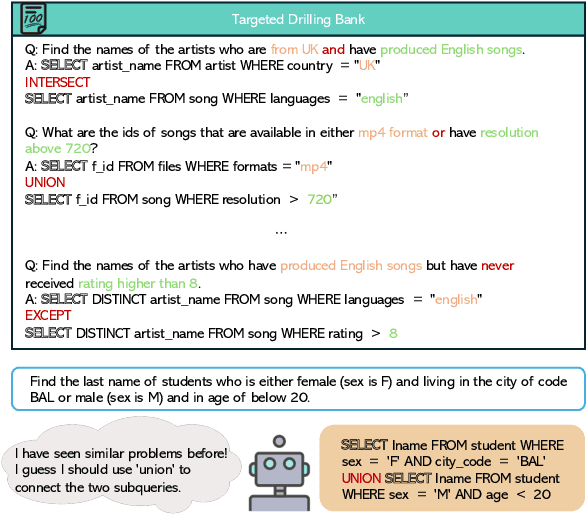

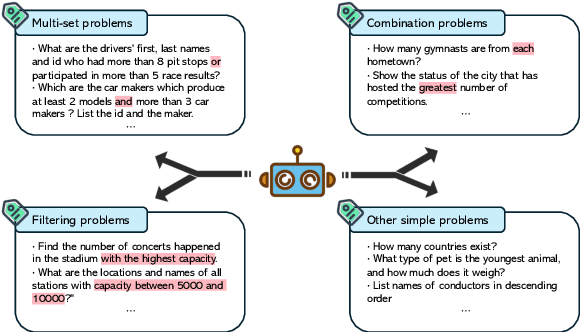
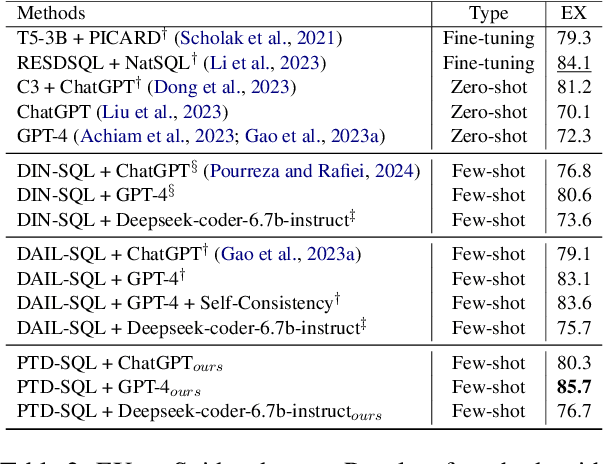
Abstract:Large Language Models (LLMs) have emerged as powerful tools for Text-to-SQL tasks, exhibiting remarkable reasoning capabilities. Different from tasks such as math word problems and commonsense reasoning, SQL solutions have a relatively fixed pattern. This facilitates the investigation of whether LLMs can benefit from categorical thinking, mirroring how humans acquire knowledge through inductive reasoning based on comparable examples. In this study, we propose that employing query group partitioning allows LLMs to focus on learning the thought processes specific to a single problem type, consequently enhancing their reasoning abilities across diverse difficulty levels and problem categories. Our experiments reveal that multiple advanced LLMs, when equipped with PTD-SQL, can either surpass or match previous state-of-the-art (SOTA) methods on the Spider and BIRD datasets. Intriguingly, models with varying initial performances have exhibited significant improvements, mainly at the boundary of their capabilities after targeted drilling, suggesting a parallel with human progress. Code is available at https://github.com/lrlbbzl/PTD-SQL.
 Add to Chrome
Add to Chrome Add to Firefox
Add to Firefox Add to Edge
Add to Edge